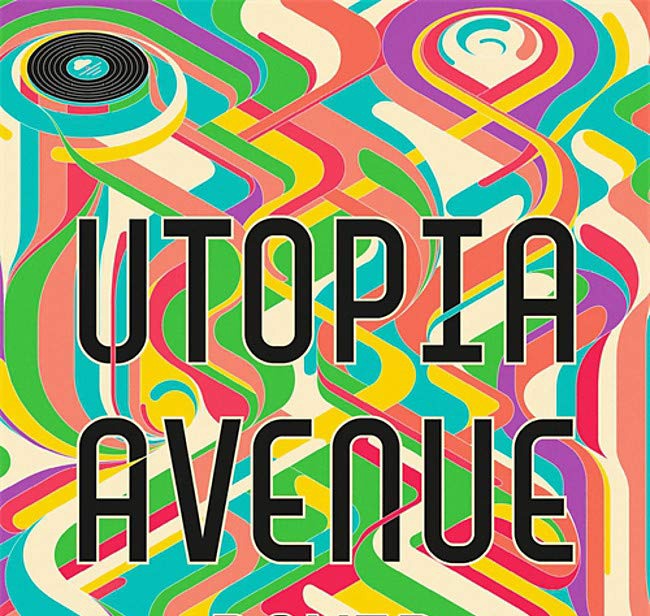
Utopia Avenue is the ninth novel by David Mitchell but is his first attempt at delving into the labyrinth of the late 1960’s music scene. From the opening line Mitchell festoons this novel with music references beginning with London’s Denmark Street with its array of music shops and (once upon a time) cascade of music venues and bars. The reader explores the lives of the four band members coming from different walks of life who are put together by manager Levon Frankland.
The first band member we are introduced to is Gravesend cockney Dean Moss who within less than one day hits rock bottom. He is saved by Levon who remembers his talent in his previous band Battleship Potemkin and takes him to the famous 2i’s venue (which launched the careers of Cliff Richard and Hank Marvin) at 59 Old Compton Street to talent scout. At 2i’s Levon and Dean poach Dutch bassist Jasper de Zoet and northern drummer Peter “Griff” Griffin from the Archie Kinnock Band. Elf, who has just been dumped by her ex Bruce (who she was in a folk duo with) is then recruited as the lead singer and keyboard player after the four men see her perform at Les Cousins.
The year is 1967 and initially flirting with the band name “The Way Out”, the band play The UFO Club opening for Pink Floyd. Syd Barrett is immortalised with his “stagecraft and Byronic looks” whilst Roger Waters’ “cloak and dagger smile” is also referenced. Post-gig the band accompanied by David Bowie (who is talking about his dream of Berlin) walk around Soho and stumble upon the street name called Utopia Avenue. With a nod of approval from the man who would soon be named as “The Thin White Duke”; the four band members had found their band name.
Naturally, career progression of Utopia Avenue was not as easy as agreeing upon a band name. The next gig venue is ninety per cent empty, the police are called and Dean gets beaten up. The road to recognition, record contracts and chart entries is a slow journey earned with hard labour whilst at times is hard reading. The hilarious fictional interaction with real-life band members and celebrities is delightfully absurd. These interactions get more insane as Utopia Avenue achieve acclaim.
Some of the many interactions with celebrities and infamous characters include Elf talking about the Lord of the Rings books (the films hadn’t been made yet!) with Mark Bolan, Elf chickening out of LSD with her ex Bruce and Alan Ginsberg, the band performing their debut single on Top of the Pops hosted by Jimmy Saville, manager Levon’s encounter with Francis Bacon at a Bill Evans jazz gig, Dean putting Jimi Hendrix and Brian Jones numbers into his little black book and the band going to a Chelsea Hotel party hosted by Janis Joplin where Lenny (Leonard Cohen) plays an acoustic set.
Despite the band members not knowing each other until they were thrown unexpectedly together by Levon; the way the band members bring their musical influences together with Dean (R&B), Griff (jazz), Elf (folk) and Jasper (virtuosity) is incredible. Despite this novel not being accompanied by a soundtrack; the individual and collective band member’s songwriting and musical arrangement process is deftly documented from experimenting with time signatures to the way Dean tunes his guitar to DADF#AD with the capo on the fourth fret.
The antithetical band members and manager Levon form bonds and lasting emotional friendships very quickly. Whilst they do occasionally disagree; a collective solution is found which almost instantly puts things to bed permanently as opposed to keeping them brushed under the carpet like dormant volcano. On the surface, this appears to be all too convenient and to quote Mitchell “utopic”. Nonetheless one appreciates the authenticity and how these relationships solidify so harmoniously despite the many tragedies and troubling situations the individual band members find themselves in.
Whilst Mitchell accurately depicts the magic of the bustling music scenes of London and America in 1967 and 1968; he deserves even greater credit for accurately depicting the reality of the many social ills that defined this period. Whilst homosexuality had just been decriminalised in the UK the band constantly fear for the safety of their “out” manager. Racism was not discreet with Dean’s landlady adding the words “No Blacks, No Irish” to her room letting advertisement. The fight for women’s suffrage still has a lot further to go with Elf’s father saying that his bank had a policy of not hiring married women and Elf herself fearing Utopia Avenues’ failure would result in her being stuck working in a typing pool. The biggest irony is the anti-Semitic manager of Allegro Records who has the power to give or deny bands media coverage by the NME espousing Jewish Conspiracy theories about how the Jews control the media.
The most heart-breaking element of 1967 and 1968 is that Jasper himself and society does not have the full understanding of his social awkwardness which is referred to as “Emotional Dyslexia”. Jasper enters a room without knocking and the simile of Stan Laurel is applied to his facial features when he frequently can’t understand social cues and situations. Unfortunately for Jasper the term “Autism” was back then only used within the exclusive remit of child psychologists. Mitchell despite his knowledge and experience of autism deserves credit for refraining from using this term. Sadly for de Zoet, “Emotional Dyslexia” is not the only problem he has to contend with.
Many rock ‘n’ roll stories involve the deaths of young people in their twenties. Fortunately in Utopia Avenue, none of them dies aged twenty-seven thus avoiding the cliché of “27 Club” debacle. Mitchell pulls off the greatest heist by including fictional bisexual composer and author Robert Frobisher from his previous best-selling novel Cloud Atlas into the equation without detracting from the authenticity of Utopia Avenue. Utopia Avenue reveals the wonderful and exciting stories of the now-defunct music venues and reminds music lovers just how sacrosanct our remaining and under threat music venues are and the importance of the work of https://saveourvenues.co.uk in keeping them afloat.
Despite several anachronisms “Utopia Avenue” has the ability to take the reader beyond fiction and impress not just music enthusiasts and baby boomers who lived through this era, but all music enthusiasts and anyone wanting to experience a “Trip” without side effects and applying blotted paper to one’s tongue.


Be the first to comment